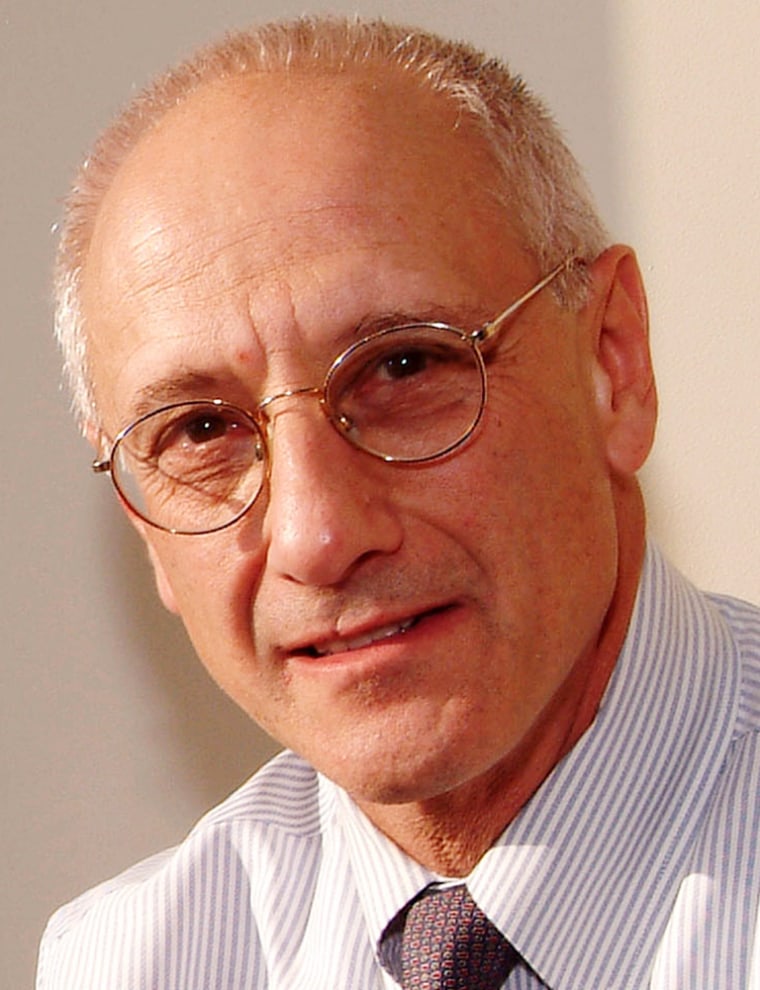A conversation with Jon Kingsdale, a former insurance executive who heads the new agency running the Massachusetts program working toward universal health insurance, the Commonwealth Health Insurance Connector Authority. (For the main story, click here, and check out the details of the reform.)
MSNBC: The main criticism of the program seems to be that it doesn't hold down the costs of health care but just forces everyone to buy a particular product, health insurance.
Kingsdale: First, I think it's important to recognize what we have done on costs. The reform of the non-group market, combined with the competitive bidding that we've gone through, and the availability of a lot more product choice, has resulted in halving the premium and doubling the benefits in the non-group market.
Having said that, most people don't buy in the non-group — they buy through an employer. There are a lot of things we can do in the medical-delivery system and society to control costs. These will require some real leadership on the part of the state, getting all the parties to collaborate.
You don't have to cut into quality to improve costs. For example, we could reduce the horrific rate of hospital-acquired infections — the cost is half a billion dollars a year alone in Massachusetts. And that's just the financial cost.
Another example, we have a really crazy system where we don't really manage the flow of patients who can be scheduled into the operating rooms to make maximum use of them. We could reduce emergency room diversions, crowding in the emergency rooms — they're waiting for operating rooms.
Physicians could have computerized ordering of drugs, so they order the lower-cost drugs.
There's lots to be done. I do think the state — which is a big purchaser — can find ways to use its leverage.
MSNBC: We understand that you have to get the young, healthy people to sign up to balance the books.
Kingsdale: So many of the uninsured are young and quote-unquote invincible. What we have now is that people who don't sign up are in a position to demand that the people who do sign up pay for them when they get sick. They're a net tax on the people who do buy insurance — the 92 to 94 percent who have insurance.
If you wait until you need it to buy it, it's like waiting for a death sentence and then buying life insurance. Meantime, if you step off the curb and get hit by a bus, you expect the ambulance to come.
MSNBC: What lessons have been learned so far from the Massachusetts experiment?
Kingsdale: One is the importance to take the time to build consensus around this major change — it's one sixth of our economy, it's huge — and if you're going to make major change you're going to have to have broad support.
The second lesson is, you can make the non-group market work. Individuals across the country find that insurance is either impossibly priced or not available when you need it.
Third, if we succeed, and we still have a lot more work to do, we can demonstrate that this country doesn't have to be locked into a pattern of inaction on such an important issue as getting people health insurance and medical care. That's, I hope, an inspirational message to other states.
MSNBC: Critics have said that the insurance companies had too large a hand in crafting this program.
Kingsdale: There's no question that — it's a mark of the success and the political sophistication of this — that everyone did contribute: business, labor, religious groups, physicians, hospitals and insurance companies.
You can argue whether you want to build on what you've got, or tear it apart and replace it . The idea that we're going to tear apart one-sixth of our economy and replace it with what? Nationalize it? There'd be a lot of people waiting to see a doctor while you do that. On the other hand, there's blame enough for everyone in the system we're trying to reform. You could say no more payments to specialists, because they make too much money. or to hospitals, because there's a lot of duplication, waste and middlemen. In Massachusetts, they're all trying to reform the system.
There are any number of countries that have universal coverage and have insurance plans. Most industrialized countries don't have a single-payer system.
I would like to say this: Frankly there are a lot of people outside of Massachusetts who, I think, for ideological reasons want this to fail. To the point where they're absolutely willing to assume failure in the absence of hard proof. I think it's working. I think we've made remarkable progress: 10 to 15,000 newly enrolled every month, preserving and enhancing a broad degree of support. Two-thirds in the surveys support this reform and the individual mandate. I think it's working so far.
On the far left, there are people who are single-payer enthusiasts. On the far right, there are market enthusiasts. In our reform, there is some degree of social solidarity, a lot of tax subsidy to help make this work. And a requirement on the individual, on employers, a lot of government leadership that people on the right call intrusion. And they already know that doesn't work — in their mind. Nobody in America wants to be told what to do.
But for the vast majority who are already buying health insurance, 90 to 95 percent, they're going to benefit from having that last 5 or 10 percent to buy in.
